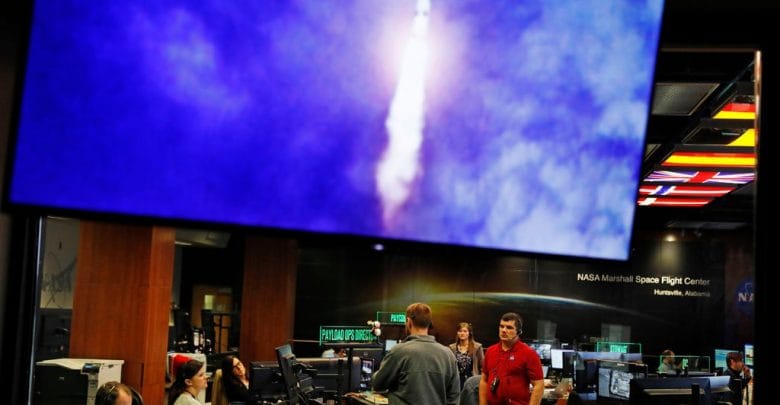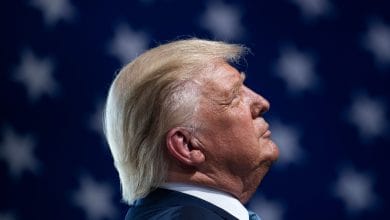
Los cinco argumentos más absurdos de Trump sobre el cierre gubernamental
Ah, y sobre ese muro. Aquí hay un plan de financiamiento en el que todos ganan.
Me gustaría disculparme con todas las «repúblicas bananeras» que he ofendido a lo largo de décadas con referencias sarcásticas a su disfunción. Esto es karma: Ahora vivo en una nación donde un presidente petulante ha cerrado gran parte del gobierno más poderoso del mundo, así que la Casa Blanca ni siquiera está pagando sus cuentas por servicio del agua.
El gobierno ha estado cerrado en el pasado, bajo presidentes de ambos partidos. Pero este cierre es particularmente infantil e innecesario; parafraseando a Churchill, rara vez tantos han sufrido tanto a manos de tan pocos.
Es difícil escoger el más absurdo de los argumentos que el presidente Trump está haciendo sobre el cierre – hay un vasto buffet de imbecilidad para elegir – pero aquí está mi esfuerzo de buena fe.
1. ¡Esto es una crisis! ¡Los terroristas están cruzando la frontera! ¡Violadores!
Esto es más una pausa que una crisis. El número de personas detenidas en la frontera sigue siendo casi el más bajo de los últimos 45 años. A partir de 1972, cada año se produjeron más detenciones que en 2017.
En cuanto a los terroristas, los expertos afirman que no hay un solo caso conocido de un terrorista que se haya colado en los Estados Unidos a lo largo de áreas no cercadas de la frontera sur. Nunca.
2. Sólo un muro puede lograr el objetivo. Un muro grande y hermoso que detenga a la gente y a las drogas.
La portavoz de la Cámara de Representantes, Nancy Pelosi, se equivocó al describir el muro como «una inmoralidad», ya que necesitamos seguridad fronteriza, y un muro en algunos lugares puede ser efectivo. Pero una gran mayoría de los inmigrantes indocumentados en el país no llegaron a hurtadillas a través de la frontera, sino que vinieron legalmente; a menudo por los aeropuertos, y se quedaron más tiempo que lo permitido por sus visas. Los muros más hermosos no las detendrían.
Asimismo, el contrabando de drogas es un problema real, pero la mayoría de los estupefacientes se han introducido de contrabando en camiones, automóviles y aviones en los puertos oficiales de entrada, o a través de túneles bajo la frontera, o a través del sistema postal, y no a través de personas que crucen partes remotas de la frontera.
El programa de TV «Daily Show» sacó a relucir un discurso de graduación universitaria en 2004 en el que Trump señalaba que la perseverancia que simplemente implica construir muros, por sí misma, no es terriblemente efectiva: «Nunca, nunca te rindas». … «Si hay un muro de concreto frente a ti, atraviésalo, bríncalo, rodéalo, pero ve al otro lado del muro».
3. ¡Pero esto es una cuestión humanitaria!
Sí, lo es. La preocupación humanitaria más atroz ha sido la brutal política de Trump de separar a los niños de sus padres en la frontera.
«Los niños todavía están siendo separados», me dijo Lee Gelernt de la A.C.L.U. La mayoría de las veces el gobierno hace esto cuando dice que un padre tiene un historial criminal, pero las ofensas a veces son menores o no están justificadas.
Mientras tanto, el cierre del gobierno causa otras tragedias. Por ejemplo, incluso en tiempos normales, 3.000 personas mueren cada año en Estados Unidos a causa de enfermedades transmitidas por los alimentos; sin embargo, la Administración de Alimentos y Medicamentos (FDA) ha tenido que detener la mayoría de las inspecciones rutinarias de alimentos, y los inspectores han sido enviados a casa con licencia. El resultado puede ser que más personas se enfermen o mueran por intoxicación alimentaria.
4. El presidente no necesita al Congreso. Después de todo, ¡es el presidente!
Mucha gente se sentiría un poco aliviada si Trump tomara la dudosa ruta de declarar una emergencia nacional y tratar de robar, er, desviar dinero destinado a las víctimas de desastres naturales para pagar por su muro. Podría ser una forma de salir de nuestro estancamiento nacional, permitiendo que el gobierno reabra su funcionamiento.
Pero miren, amigos, cuando damos la bienvenida a nuestro presidente haciendo algo posiblemente ilegal, ya que injustamente toma dinero de las víctimas de desastres, eso sólo confirma que tenemos una crisis – no en la frontera sino en Washington.
El muro de Trump no tiene que ver con gobernar, sino con crear un símbolo político y de movilizar a su base. El problema es que ése es un símbolo caro.
Según mis cálculos, los 5.700 millones de dólares podrían enviar a 100.000 niños estadounidenses en riesgo a un centro preescolar de alta calidad durante un año, y proporcionar becas Pell a 100.000 estudiantes para que asistan a la universidad durante cuatro años completos, y sobrando incluso dinero suficiente para que TAMBIÉN se proporcione un año de tratamiento integral a 115.000 estadounidenses que luchan contra la adicción a los opiáceos.
5. De todos modos, México pagará por el muro.
Trump ha declarado repetidamente que México pagaría por el muro, y todavía insiste en que México pagará por ello indirectamente «“muchas, muchas veces más». Así que tengo una solución para todo este lío.
Dado que México pagará por el muro eventualmente, el problema actual es de flujo de caja. Afortunadamente, disponemos de instrumentos financieros para abordar precisamente esta cuestión.
Propongo que Trump pague los 5.700 millones de dólares él mismo, y entonces los Estados Unidos le pagarán (con una buena tasa de interés) a medida que los pagos mexicanos por el muro aparezcan. La Reserva Federal puede verificar el flujo de ingresos de México y enviar las sumas a Trump.
Ya que está tan seguro de que el muro se pagará por sí mismo, debería estar encantado con esta opción. ¿Verdad, Sr. Presidente?
Nicholas Kristof ha sido columnista de The Times desde 2001. Ha ganado dos premios Pulitzer, por su cobertura de China y del genocidio en Darfur. Puede suscribirse a su boletín informativo gratuito por correo electrónico dos veces por semana y seguirlo en Instagram. @NickKristof • Facebook
Traducción: Marcos Villasmil
____________________________________________
NOTA ORIGINAL:
The New York Times
Trump’s Five Craziest Arguments About the Shutdown
Oh, and about that wall. Here’s a financing plan that’s a win-win.
I’d like to apologize to all the “banana republics” I’ve offended over the decades with snarky references to their dysfunction. This is karma: I now live in a nation where a petulant president has shut down much of the most powerful government in the world — so the White House isn’t even paying its water bills.
The government has shut down before, under presidents of both parties. But this shutdown is particularly childish and unnecessary; to revise Churchill, rarely have so many suffered so much at the hands of so few.
It’s difficult to pick the craziest of the arguments that President Trump is making about the shutdown — there’s a vast buffet of imbecility to choose from — but here’s my good-faith effort.
1. This is a crisis! Terrorists are crossing the border! Rapists!
This is more like a lull than a crisis. The number of people apprehended at the border remains near a 45-year low. From 1972 on, there were more apprehensions every single year than there were in 2017.
As for terrorists, experts say that there isn’t a single known case of a terrorist sneaking into the United States along unfenced areas of the southern border. Ever.
2. Only a wall can do the job. A big beautiful wall that stops people and drugs.
House Speaker Nancy Pelosi was wrong to describe a wall as “an immorality,” for we need border security, and a wall in some places can be effective. But a great majority of the undocumented immigrants in the country didn’t arrive by sneaking across the border, but rather came legally, often at airports, and overstayed their visas. The most beautiful of walls wouldn’t stop them.
Likewise, drug smuggling is a real problem, but narcotics have mostly been smuggled in on trucks, cars and airplanes at official ports of entry, or through tunnels under the border, or through the postal system — not by individuals crossing remote parts of the border.
“The Daily Show” dug up a 2004 college graduation speech in which Trump counseled perseverance of just the kind that makes walls, by themselves, not terribly effective: “Never, ever give up. … If there’s a concrete wall in front of you, go through it, go over it, go around it, but get to the other side of the wall.”
3. But this is a humanitarian issue!
Yes, it is. The most egregious humanitarian concern has been Trump’s brutal policy of separating children from parents at the border.
“Kids are still being separated,” Lee Gelernt of the A.C.L.U. told me. Mostly the government does this when it says that a parent has a criminal history, but the offenses sometimes were minor or unsubstantiated.
Meanwhile, the government shutdown causes other tragedies. For example, even in normal times 3,000 people a year die in the United States from food-borne illness, yet the Food and Drug Administration has now had to stop most routine food inspections, with inspectors sent home on furlough. The result may well be more people getting sick or dying from food poisoning.
4. The president doesn’t need Congress. After all, he’s the president!
Plenty of people would be a bit relieved if Trump took the dubious route of declaring a national emergency and trying to steal, er, divert money intended for disaster victims to pay for his wall. It might be a way out of our national stalemate, allowing the government to reopen.
But look, folks, when we welcome our president doing something possibly illegal, as he unjustly takes money from disaster victims, that just confirms that we have a crisis — not at the border but in Washington.
Trump’s wall isn’t about governing but about creating a political symbol and rallying his base. The problem is that it’s an expensive symbol.
By my calculations, the $5.7 billion could send 100,000 at-risk American kids to a high-quality preschool for a year AND provide Pell grants for 100,000 students to attend college for a full four years, with enough left over to ALSO provide a year’s comprehensive treatment to 115,000 Americans struggling with opioid addiction.
5. Anyway, Mexico will pay for the wall.
Trump repeatedly declared that Mexico would pay for the wall, and he still insists that Mexico will pay for it indirectly “many, many times over.” So I have a solution to the whole mess.
Since Mexico will pay for the wall eventually, the problem now is one of cash flow. Fortunately, we have financial instruments to deal with precisely this issue.
I propose that Trump pay the $5.7 billion himself, and then the U.S. will repay him (with a nice interest rate) as the Mexican payments for the wall pour in. The Federal Reserve can verify the Mexican income stream and forward the sums to Trump.
Since he’s so confident that the wall will pay for itself, he should be delighted with this option. Right, Mr. President?
Nicholas Kristof has been a columnist for The Times since 2001. He has won two Pulitzer Prizes, for his coverage of China and of the genocide in Darfur. You can sign up for his free, twice-weekly email newsletter and follow him on Instagram. @NickKristof • Facebook
